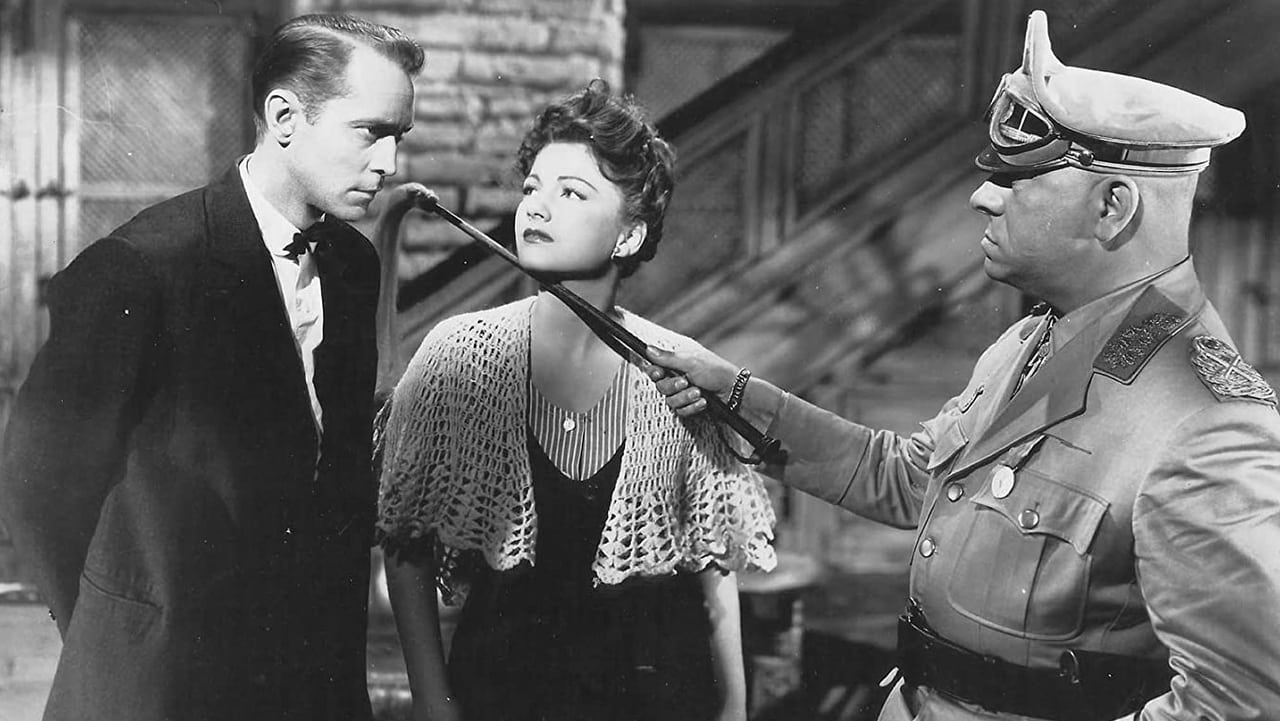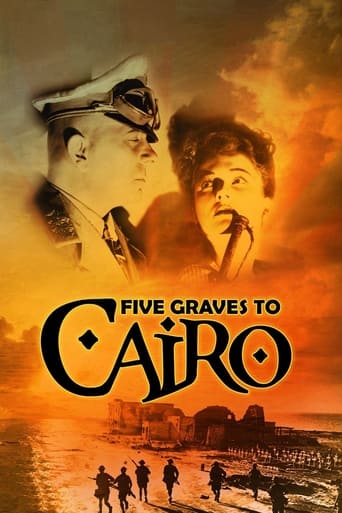

Excellent, smart action film.
... View MoreBad Acting and worse Bad Screenplay
... View MoreThis movie was so-so. It had it's moments, but wasn't the greatest.
... View MoreThis film is so real. It treats its characters with so much care and sensitivity.
... View MoreThis Early Billy Wilder Film (His second) is as Good as it is because Wilder and His Co-Writer, Charles Brackett, had Control of the Project. It's an Off-Beat, Propagandized War Movie with Strong Writing, Good Performances, and a Low-Key Lighting Atmosphere of Suspense and Intrigue.Heavily Scripted (Oscar Nomination for Adapted Screenplay), Witty, sometimes Humorous (although the Over-the-Top Caricatures are irritating and the worst part of the Movie). It's the Dialog that is Funny and Not the Buffoons Akim Tamiroff and Fortunio Bonanova. Anne Baxter is Solemn and Serious, and Franchot Tone is Serviceable but Unremarkable. It is Erich Von Stroheim that Steals the Show along with the Wilder and Brackett Screenplay. The Movie is Heavily Plotted for Maximum Enticement and Includes Cinematography that is just Right for the Setting.Pay Attention to the Dialog because that is where the Gems can be found. Some of it is Profound and some of it has an Underlying Brutality. Overall, Forgiven the sometimes Overly Patriotic and Propaganda Musings, the Film is Worth a Watch for Wilder, Brackett, and Stroheim. Slightly Overrated, but it is Certainly Different in a lot of respects and that makes it Slightly Special.
... View MoreI must begin with a bias I have: I almost never like war movies. Very occasionally one will come along that keeps my attention...IF there is something unique about it. And this film does have a rather unique story line. So, it held my attention sufficiently to lead me to watch the entire film.On the other hand, the film had one actor in it I have never liked in the few films I have seen him in: Erich von Stroheim. Had I ever met this man, I rather imagine I would have disliked him intensely. I much prefer the performance of James Mason as Rommel in "The Desert Fox: The Story of Rommel" (1951). In this film...well, I don't know...perhaps Rommel was the pig he appeared to be in this film...but I doubt it.Oh well, I still watched the film, and one thing I liked about it was the performance by Franchot Tone. While he's far from being my favorite actor, I've always rather liked him, and felt that all too often he was saddled with light "playboy-type" roles. Here there's some substance, and I think he does rather well.Anne Baxter and Akim Tamiroff do well enough, as well, although perhaps Tamiroff's role was played with a bit too much humor, although I have a hunch that is the responsibility of director Billy Wilder.I think the thing that people question about this film is whether the plot is at all logical. Reviewer Bosley Crowther questioned that. I question that. Think about it -- a tank is driving across the desert. All in it are dead...it is kept going only because as the tank goes up and down the dunes, the driver falls against and away from the controls. But wait. There is one man still barely alive. He escapes the tank, wanders across the desert and into a hotel which is about to be occupied by Rommel (and the tank corps). And BTW, all this action without a single drink of water for a man with sunstroke! Rommel (Erich von Stroheim) arrives, and the soldier (Tone) pretends to be the hotel waiter...with a club foot...and, unknown to him the real waiter (now dead) was a German advance man...and he begins to play double agent...and then the body of the real waiter is found...and.... It's all pretty clever, but you do have to roll your pant legs up just a bit, because after a while there gets to be just too many coincidences to be logical.The ending of the film is quite impressive.As I implied, there are some illogical aspects to this film, but it's still rather entertaining. Recommended, at least once.
... View MoreFive Graves to Cairo is directed by Billy Wilder who also co-adapts the screenplay with Charles Brackett. It's based on the Lajos Biró play Hotel Imperial. It stars Franchot tone, Anne Baxter, Akim Tamiroff, Erich von Stroheim and Peter Van Eyck. Music is by Miklós Rózsa and cinematography by John Seitz.Tone plays John Bramble, the sole survivor of a British tank division who stumbles into a near deserted desert town only to find it suddenly fill up with Field Marshall Rommel and his troops. Assuming the identity of a dead waiter at the hotel run by Farid (Tamiroff), Bramble gains the trust of everyone only to learn that the waiter he is pretending to be was actually a secret agent for the Germans. If he can keep up the pretence and not get found out, Bramble could have great impact on the North Africa Campaign.A cracker is this, an early Billy Wilder film that thrives on tension and clever plotting while pulsing with great literate strength. Cast are more than capable of making the material work as well, with Tone nicely restrained, Baxter very touching (decent French accent too) and Von Stroheim a ball of emotions as a complex laden Rommel. Tech credits are grade A stuff, the sound department and Seitz's photography especially lifting the picture still further to classic status. This is no high energy war movie, it's character driven but all the better for it, with Wilder even slotting in moments of humour to sit alongside the sharper edges of the dialogue. From the sombre opening of a tank aimlessly trudging across the desert, its pilot hanging dead from the turret, to a very touching finale involving a parasol, Wilder's movie holds the attention greatly. A masterful story brought to us by a master director. 8/10
... View MoreThe films of writer, producer director Billy Wilder are regarded as some of the finest works of cinematic art in the history of motion pictures. Wilder, who with a handful of film pioneers such as John Ford, Howard Hawks, Anthony Mann, John Houston and Henry Hathaway et al forged and created a unique style in the production of films that today are looked upon as enduring, inspired and unsurpassed classics. In the case of Wilder such dramatic and sublime fare as "Double Indemnity" (1944), "Ace In the Hole" (1951) and Hollywood's greatest film about itself "Sunset Boulevard" (1950). Plus his comedies like "The Apartment" (1960) and "Some Like It Hot" (1959) - regarded by many to be the funniest film ever made - can never, let's face it, be equalled. There is a timelessness and ageless quality about them that reaches out to anyone who watches them regardless of their generation. Contemporory film maker Cameron Crowe observed "Wilder's work is a treasure trove of flesh and blood individuals, all wonderfully alive".It is hard to believe that one of Wilder's earliest Hollywood efforts FIVE GRAVES TO CAIRO was made in 1943. It seems to be a much later film in look, approach and concept. Yet this quite intriguing spy drama was the result of the day's headlines being utilized by Wilder for the movie's scenario. Based on Lajos Biro's play "Hotel Imperial" it was superbly written by Charles Brackett and Wilder and sharply photographed in monochrome by John Seitz. It was produced by Brackett for Paramount Pictures and was masterfully directed by Wilder. Franchot Tone is British tank Corporal John Bramble who stumbles into a Sahara oasis hotel after crawling through the desert during the North African campaign in 1942. The Germans also arrive at virtually the same time headed by none other than the infamous German Field Marshall Erwin Rommel (Erich Von Stroheim). Rommel and his command take up residence in the hotel run by nervous local Arab Farid (Akim Tamiroff) and an attractive Alsatian maid Mouche (Anne Baxter). To conceal his identity Bramble pretends to be the hotel waiter and as such tries to find out from the formidable quest exactly where on the map the German arms dumps are located. With help from Farid and the maid and gaining Rommel's confidence he eventually acquires the information but not before Mouche sacrifices herself so that Bramble can leave and get back to the British lines.Performances are uniformly excellent! Tone gives an engaging portrayal of a reluctant spy. Anne Baxter has rarely been better than here in the role of the ill-fated Mouche and the amusing Akim Tamiroff as the ever fearful and stammering Farid is as appealing as ever. But the picture belongs to Von Stroheim! His striking performance just steals the show. Although the actor didn't resemble Rommel in the slightest his embodiment of the character is exactly what you would imagine the great German battlefield strategist should have, perhaps, looked like. Rommel himself died in 1944. It is interesting to ponder if he ever saw the picture and what his thoughts on Von Stroheim's flamboyant portrayal of himself might have been.Complimenting the picture throughout is the terrific score by Miklos Rozsa. Rozsa was one of Wilder's favourite composers and wrote the music for some of the director's best films like "Double Indemnity" (1944), "Lost Weekend" (1945) and "The Private Lives Of Sherlock Holmes" (1970). For FIVE GRAVES TO CAIRO he wrote a spirited and heroic march to point up the British forces movements and a reflective and ravishing character theme for the maid Mouche which is given lovely renditions on solo violin.FIVE GRAVES TO CAIRO is a superb and suspenseful spy thriller set in an atmospheric war background. And thanks to the great Billy Wilder it's a great movie that simply refuses to age in its appeal.Classic moment from FIVE GRAVES TO CAIRO:Rommel, sitting up in bed as Mouche (Anne Baxter) enters with his breakfast, "I don't like women in the morning" he declares and when she pours his coffee and with a gesture of the back of his hand he instructs her to "take two steps back please".
... View More